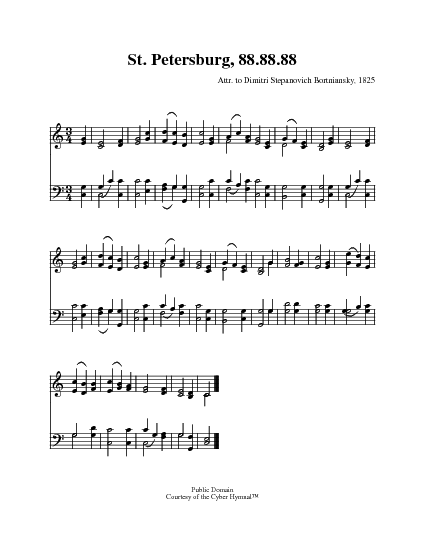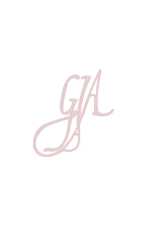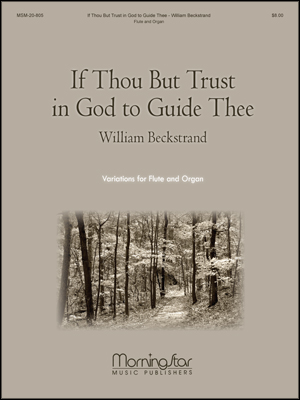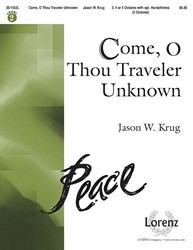- |
User Links
Wrestling Jacob

Come, O Thou Traveler unknown
Author: Charles Wesley (1742)Published in 290 hymnals
Printable scores: PDF, MusicXMLAudio files: MIDI, Recording
Representative Text
1. Come, O thou traveler unknown,
Whom still I hold, but cannot see!
My company before is gone,
And I am left alone with thee;
With thee all night to stay
And wrestle till the break of day.
2. I need not tell thee who I am,
My misery or sin declare;
Thyself hast called me by my name;
Look on thy hands and read it there!
But who, I ask thee, who art thou?
Tell me thy name, and tell me now.
3. In vain thou strugglest to get free;
I never will unloose my hold.
Art thou the Man that died for me?
The secret of thy love unfold;
Wrestling, I will not let thee go,
Till I thy name, thy nature know.
4. Wilt thou not yet to me reveal
Thy new, unutterable name?
Tell me, I still beseech thee, tell,
To know it now, resolved I am;
Wrestling, I will not let thee go,
Till I thy name, thy nature know.
5. ’Tis all in vain to hold thy tongue,
Or touch the hollow of my thigh:
Though every sinew were unstrung,
Out of my arms thou shalt not fly;
Wrestling, I will not let thee go,
Till I thy name, thy nature know.
6. What though my shrinking flesh complain,
And murmur to contend so long,
I rise superior to my pain;
When I am weak, then I am strong;
And when my all of strength shall fail,
I shall with the God-man prevail.
7. My strength is gone, my nature dies,
I sink beneath thy weighty hand,
Faint to revive, and fall to rise;
I fall, and yet by faith I stand;
I stand, and will not let thee go,
Till I thy name, thy nature know.
8. Yield to me now—for I am weak,
But confident in self-despair!
Speak to my heart, in blessings speak,
Be conquer’d by my instant prayer;
Speak, or thou never hence shalt move,
And tell me, if thy name is love.
9. ’Tis love! ’tis love! thou diedst for me!
I hear thy whisper in my heart.
The morning breaks, the shadows flee:
Pure, universal love thou art;
To me, to all thy passions move;
Thy nature and thy name is love.
10. My pray’r hath power with God; the grace
Unspeakable I now receive,
Through faith I see thee face to face;
I see thee face to face and live!
In vain I have not wept and strove;
Thy nature and thy name is love.
11. I know thee, Savior, who thou art:
Jesus, the feeble sinner’s friend;
Nor wilt thou with the night depart,
But stay and love me to the end;
Thy mercies never shall remove,
Thy nature and thy name is love.
12. The Sun of Righteousness on me
Hath rose, with healing in his wings;
Withered my nature’s strength; from thee
My soul its life and comfort brings;
My help is all laid up above;
Thy nature and thy name is love.
13. Contented now, upon my thigh
I halt, till life’s short journey end;
All helplesness, all weakness I,
On thee alone for strength depend,
Nor have I power from thee to move;
Thy nature and thy name is love.
14. Lame as I am, I take the prey,
Hell, Earth, and sin with ease o’ercome;
I leap for joy, pursue my way,
And as a bounding hart fly home,
Through all eternity to prove
Thy nature and thy name is love.
Source: Hymns and Devotions for Daily Worship #248
Author: Charles Wesley
 Charles Wesley, M.A. was the great hymn-writer of the Wesley family, perhaps, taking quantity and quality into consideration, the great hymn-writer of all ages. Charles Wesley was the youngest son and 18th child of Samuel and Susanna Wesley, and was born at Epworth Rectory, Dec. 18, 1707. In 1716 he went to Westminster School, being provided with a home and board by his elder brother Samuel, then usher at the school, until 1721, when he was elected King's Scholar, and as such received his board and education free. In 1726 Charles Wesley was elected to a Westminster studentship at Christ Church, Oxford, where he took his degree in 1729, and became a college tutor. In the early part of the same year his religious impressions were much deepene… Go to person page >
Charles Wesley, M.A. was the great hymn-writer of the Wesley family, perhaps, taking quantity and quality into consideration, the great hymn-writer of all ages. Charles Wesley was the youngest son and 18th child of Samuel and Susanna Wesley, and was born at Epworth Rectory, Dec. 18, 1707. In 1716 he went to Westminster School, being provided with a home and board by his elder brother Samuel, then usher at the school, until 1721, when he was elected King's Scholar, and as such received his board and education free. In 1726 Charles Wesley was elected to a Westminster studentship at Christ Church, Oxford, where he took his degree in 1729, and became a college tutor. In the early part of the same year his religious impressions were much deepene… Go to person page >Text Information
| First Line: | Come, O Thou Traveler unknown |
| Title: | Wrestling Jacob |
| Author: | Charles Wesley (1742) |
| Meter: | 8.8.8.8.8.8 |
| Language: | English |
| Copyright: | Public Domain |
| Article: | "Wrestling Jacob" by James Hart Brumm (from The Hymn) |
English
- A Choice Selection of Hymns and Spiritual Songs: designed for the use of the pious #IX
- A Collection of Hymns #246
- A Collection of Hymns Adapted to the Use of the Methodist Episcopal Church #d95
- A Collection of Hymns Adapted to the use of the Methodist Episcopal Church Including the Whole Collection of the Rev. J. Wesley #ad95
- A Collection of Hymns and Spiritual Songs, Generally Used at Camp and Prayer Meetings #d41
- A Collection of Hymns for Public, Social and Domestic Worship #d138
- A Collection of Hymns for Public, Social, and Domestic Worship #441
- A Collection of Hymns for Public, Social, and Domestic Worship #d137
- A Collection of Hymns for the use of the African Methodist Episcopal Zion Church in America #649
- A Collection of Hymns for the Use of the Methodist Episcopal Church: principally from the collection of Rev. John Wesley, M. A., late fellow of Lincoln College, Oxford; with... (Rev. & corr.) #77 10 shown out of 188
French Creole
Hungarian
Spanish
Notes
Come, O Thou Traveller unknown. C. Wesley. [Prayer.] This poem was first published in Hymns & Sacred Poems, 1742, in 14 stanzas of 6 lines, and entitled "Wrestling Jacob." It is based on the incident in Jacob's life as recorded in Gen. xxxii. 24-32. Although a poem of great power and finish, it is unsuited to Public Worship. I t received the most unqualified praise from I. Watts, who, J. Wesley said, did not scruple to say, "that single poem, Wrestling Jacob, was worth all the verses he himself had written" (Minutes of Conference, 1788); and J. Montgomery wrote of it as:—
"Among C. Wesley's highest achievements may be recorded, "Come, O Thou Traveller unknown," &c., p. 43, in which, with consummate art, he has carried on the action of a lyrical drama; every turn in the conflict with the mysterious Being against whom he wrestles all night, being marked with precision by the varying language of the speaker, accompanied by intense, increasing interest, till the rapturous moment of discovery, when he prevails, and exclaims, “I know Thee, Saviour, Who Thou art.'" (Christian Psalmist, 1825. xxiii.-iv.)
Notwithstanding this high commendation, and of it as a poem it is every way worthy, its unsuitability for congregational purposes is strikingly seen in the fact that it is seldom found in any hymnal, either old or new, except those of the Methodist denominations.
In 1780 it was given, with the omission of stanzas v. and vii. in the Wesleyan Hymn Book, No. 136, in two parts, Pt. ii. being, "Yield to me now, for I am weak." These parts were subsequently (ed. 1797) numbered as separate hymns, and as such are Nos. 140 and 141 in the revised edition, 1875. In the Hymns for the use of the Methodist Episcopal Church, N. Y. 1849, it is broken up into four parts, each being numbered as a separate hymn, as:—"Come, O Thou Traveller unknown"; "Wilt Thou not yet to me reveal"; "Yield to me now, for I am weak"; and "The Sun of Righteousness on me." In their new Hymnal, 1878, which has taken the place of the 1849 book, the division, "Wilt Thou," &c, is included in the first, “Come, Thou, &c." There is also a cento from this poem in the New Congregational Hymn Book, No. 1063, beginning, "O Lord, my God, to me reveal." Original text in Poetical Works, 1868-72, vol. ii. p. 173.
--John Julian, Dictionary of Hymnology (1907)
====================
Come, 0 Thou Traveller unknown, p. 250, i. In the Primitive Methodist Hymnal, 1887, Nos. 516-18, are three centos from this poem:—(1) "Come O Thou Traveller unknown"; (2) "What though my shrinking flesh complain" ; (3) "I know Thee, Saviour, Who Thou art."
--John Julian, Dictionary of Hymnology, Appendix, Part II (1907)
Timeline
Arrangements
Media
- MIDI file from Beulah Songs: a choice collection of popular hymns and music, new and old. Especially adapted to camp meetings, prayer and conference meetings, family worship, and all other assemblies... #51
- MIDI file from The Cyber Hymnal #947
- MIDI file from The Cyber Hymnal #14338
- Audio recording from The Southern Harmony, and Musical Companion (New ed. thoroughly rev. and much enl.) #34
- MIDI file from The Southern Harmony, and Musical Companion (New ed. thoroughly rev. and much enl.) #34
- Audio recording from The United Methodist Hymnal #386


 My Starred Hymns
My Starred Hymns






